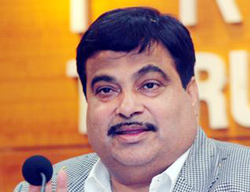New Delhi, Sep 15: Government today sought "consensus" to bring changes in the Land Acquisition Act to make it more investor-friendly but said it was not happening due to the "contradictory views" within political parties which are wanting changes in the legislation.
Rural Development Minister Nitin Gadkari also hit out at the "microscopic minority" of Opposition leaders for stalling the government's efforts to build consensus on bringing changes in the key farmer-friendly Act passed during the UPA's period.
The minister said he was "confused".
"The issue is the microscopic minority leaders sitting in Delhi. Their practical chief ministers are saying something. They are giving in writing (the need for bringing changes in the Act). These people (microscopic minority leaders) are saying something else. I am confused," Gadkari said reacting to questions on the status of the government's efforts to bring changes in the Land Acquisition Act.
Replying to the Opposition's allegations that the government was bringing changes in the Act to please the industry, he also made it clear that the priority of the NDA was welfare of poor and there was "no question of reducing compensation package for farmers whose land is acquired for projects".
"Leaders from every political party were telling me in writing to bring changes in the Act... I wish to make it clear that whenever there will be a consensus on the matter, then the government will take a decision. There is no general consensus on the issue right now," the minister said at a press conference convened to highlight the achievements of his ministries during the first 100 days of the new government.
"Leaders of the parties which have presence in Parliament are saying that you do something to bring changes in Land Acquisition Act. These are people from the CPI (M), Congress, NCP and BJP...," Gadkari said
Gadkari rejected allegations that the government was trying to make the farmer-friendly Act more industry-friendly.
"This is not an issue that favours industry or contractor," he said, adding that the development initiative of the NDA government was to address unemployment and poverty in the backward areas of the country.
"There is no question of doing any injustice to poor. Our government is committed to work for poor people," he said.
He said there is also no question of reducing the compensation package for farmers whose land is acquired for projects.
"We are trying to increase it. There is no compromise on the issue of rehabilitation of poor affected by the projects. We will try to strengthen it," Gadkari said.
He, however, did not specify about the provisions the government intends to change.
In a note sent to the PMO recently, the Rural Development Ministry, which held a meeting of the state Revenue Ministers, has suggested a number of amendments to the Act that seeks to dilute pro-farmer provisions like mandatory consent of at least 70 per cent locals for acquiring land for PPP projects and 80 per cent for acquiring land for private projects.
The ministry's proposals also include dilution of a key clause of Social Impact Assessment study criticised by states as time consuming for industrialisation process.
"The Consent Clause (Section 2(2)) should be re-examined as ownership of land vests with the government in PPP projects. The consent clause should be removed from PPP projects. Alternatively, consent requirement may be brought down to 50 per cent," the ministry has said in its note.
It has said that "mandatory Social Impact Assessment study should be done away with".
SIA should be confined to large projects/PPP projects as it may delay acquisition process.





Comments
Add new comment